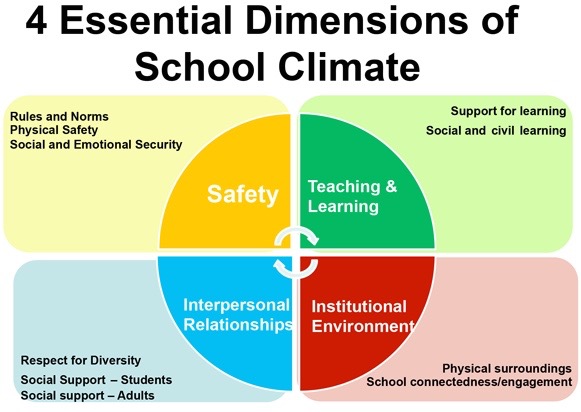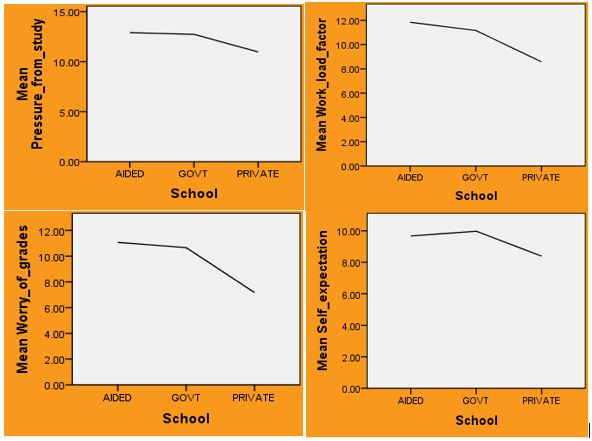JENY RAPHEAL

The National School Climate Center (NSCC) (1996) defines school climate as the quality and character of school life. School climate constitutes patterns of students’, parents ‘and school personnel’s experience of school life and reflects norms, goals, values, interpersonal relationships, teaching and learning practices, and organizational structures. Schools differ in their climate and this climate has definite role in determining the well-being and happiness of students. When we notice considerable difference in the educational stress levels of students studying in government, aided and public schools there is enough reason to trace for its causes in the school climate of those schools.
A survey was made in two Aided, two Government and two Private schools of Thrissur district in Kerala state. 261 higher secondary school students participated in the survey.
| Aided | Aleemul islam higher Secondary school, | 43 |
| Chaldean Syrian Higher secondary School, | 56 | |
| Private | Nirmalamatha Central School CBSE, | 41 |
| Sandeepany Vidhya Niketan ICSE, | 21 | |
| Government | Anchery Govt Higher Secondary School, | 48 |
| Government Model Boy’s School, | 52 |
Contrary to the usual norm prevailing among parents and teachers, private school students exhibited comparatively lower levels of stress than their counterparts in Aided and Government Schools. Aided school students had highest level of stress.
The survey which conducted during September-October 2017 probed five dimensions of educational stress namely pressure from study, workload factor, worry about grades, self-expectation and despondency. The standardized tool used for the study was a five point Likert scale developed by a group of educational researchers presided by Jiandong Sun in 2011. Before the survey it was translated into Malayalam and all statistical procedures for asserting validity and reliability were duly performed.
The mean value of stress level was “above average” for the entire sample of students participated in the study. Graphical representation of school wise comparison are given below

Why this difference?
School climate or culture will have a serious role in the educational stress of adolescents. Research findings back this perspective. At the same time socio-economic status of parents is another major factor affecting the educational stress of students. For example, there are studies showing academic anxiety is significantly low among students whose parents have higher educational qualification. Also academic stress and examination anxiety of students usually exhibit an inverse relationship with educational and income levels of their parents. Findings of researches going on in many parts of India keep on reiterating this claim.
Socio-economic status of parents is more or less same
In Kerala, private schools are where students from high socio economic status flock. In search of better avenues for excellence both in life and education the creamy layer of society opt for CBSE or ICSE syllabus for their wards. At the same time, lately, there is a trend for this group to shift into Kerala syllabus thanks to the differences in the criteria with which the grades scored by students following two syllabuses—Kerala and Central— are estimated at the time of admission for various courses for higher studies. Due to this, affluent parents too are willing to send their wards to aided schools provided; these schools maintain a reputation for their pass percentage. For this reason, one may consider that the socio economic back ground of students studying in aided and private schools are more or less same.
So there is enough reason to assume that increased stress levels noticed in the students of aided educational institutions is not exclusively due to socio-economic status and related individual differences. It might be due to some peculiarities constituting the very culture or clime of those schools.
School climate can be the reason
School climate has the potential to permeate into overall well-being of the students. For a student, school climate enters into his psychological makeup through teacher-student interactions, peer interactions, class room experiences, parent-teacher communications etc. All these interactions will be laden with the ethos for which school stands for. Educational vision/mission of the institution determines the very texture of all experiences students meet within the school. So difference in educational stress can be a difference in the educational attitude schools foster.
An in-depth enquiry into the matter will uncover the facts. Educational ministry of Kerala which is hell-bent on raising the standard of educational institutions cannot avoid this angle of exploration. Educational stress among students can jeopardize any well crafted educational policy.
In all the five indicators of educational stress, aided school scored highest which included pressure from study and worry of grades. The competition among schools to secure 100% pass in board exams and teachers pressurizing the students to meet this end is one of the salient features of working culture of teaching professionals of schools of Kerala. So whenever dealing with student educational stress the role of school climate in it must be probed into.

